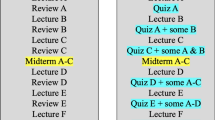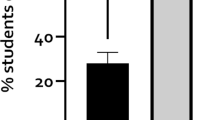Abstract
Background
The impact of clinical proficiency on individual student scores on the National Board of Medical Examiners (NBME) Subject Examinations remains uncertain. We hypothesised that increasing the length of time spent in a clinical environment would augment students’ performance.
Methods
Performance on the NBME Subject Examination in Internal Medicine (NBME-IM) of three student cohorts was observed longitudinally. Scores at the end of two unique internal medicine clerkships held at the third and fourth years were compared. The score differences between the two administrations were compared using paired t-tests, and the effect size was measured using Cohen’s d. Moreover, linear regression was used to assess the correlation between the NBME-IM score gains and performance on a pre-clinical Comprehensive Basic Science Examination (CBSE). A two-tailed p-value <0.05 was considered significant.
Results
Of the 236 students enrolled during the third year, age, gender, CBSE, and NBME-IM scores were similar across all cohorts. The normalised score gain on the NBME-IM at the fourth year was 9.5% (range −38 to +45%) with a Cohen’s d of 0.47. However, a larger effect size with a Cohen’s d value of 0.96 was observed among poorly scoring students. Performance on the CBSE was a significant predictor of score gain on the NBME-IM (R 0.51, R2 0.26, p-value < 0.001).
Conclusions
Despite the increased length of clinical exposure, modest improvement in students’ performance on repeated NBME-IM examination was observed. Medical educators need to reconsider how the NBME-IM is used in clerkship assessments.


Similar content being viewed by others
References
Frank JR, Danoff D. The CanMEDS initiative: implementing an outcomes-based framework of physician competencies. Med Teach. 2007;29(7):642–7.
Verhoeven BH, Verwijnen GM, Scherpbier AJ, van der Vleuten CP. Growth of medical knowledge. Med Educ. 2002;36(8):711–7.
Hernandez CA, Daroowalla F, LaRochelle JS, Ismail N, Tartaglia KM, Fagan MJ, Kisielewski M, Walsh K. Determining grades in the internal medicine clerkship: results of a national survey of clerkship directors. Acad Med. 2020.
NBME: National Board of Medical Examiners. Guide to Subject Examination Program In. Philadelphia: NBME; 2019.
Dong T, Swygert K, Durning S, Saguil A, Zahn CM, DeZee KJ, Gilliland WR, Cruess DF, Balog EK, Servey JT, Welling DR, Ritter M, Goldenberg MN, Ramsay LB, Artino AR Jr. Is poor performance on NBME clinical subject examinations associated with a failing score on the USMLE step 3 examination? Acad Med. 2014;89(5):762–6.
Elnicki DM, Lescisin DA, Case S. Improving the National Board of Medical Examiners internal medicine subject exam for use in clerkship evaluation. J Gen Intern Med. 2002;17(6):435–40.
Casey PM, Palmer B, Thompson G, Laack T, Thomas M, Hartz M, Jensen J, Sandefur B, Hammack J, Swanson J, et al. Predictors of medical school clerkship performance: a multispecialty longitudinal analysis of standardised examination scores and clinical assessments. BMC Med Educ. 2016;16:128.
Ryan MS, Bishop S, Browning J, Anand RJ, Waterhouse E, Rigby F, Al-Mateen CS, Lee C, Bradner M, Colbert-Getz JM. Are scores from NBME subject examinations valid measures of knowledge acquired during clinical clerkships? Acad Med. 2017;92(6):847–52.
Downing SM. Validity: on meaningful interpretation of assessment data. Med Educ. 2003;37(9):830–7.
Griffith CH 3rd, Wilson JF, Haist SA, Albritton TA, Bognar BA, Cohen SJ, Hoesley CJ, Fagan MJ, Ferenchick GS, Pryor OW, et al. Internal medicine clerkship characteristics associated with enhanced student examination performance. Acad Med. 2009;84(7):895–901.
Ouyang W, Cuddy MM, Swanson DB. US medical student performance on the NBME subject examination in internal medicine: do clerkship sequence and clerkship length matter? J Gen Intern Med. 2015;30(9):1307–12.
NBME: International Foundations of Medicine Program. Basic Science Examination Content Outline Program In. Philadelphia: NBME; 2021.
Morrison C, Ross L, Baker G, Maranki M. Implementing a new score scale for the clinical science subject examinations: validity and practical considerations. Med Sci Educ. 2019;29(3):841–7.
Cohen J. A power primer. Psychol Bull. 1992;112(1):155–9.
Raupach T, Vogel D, Schiekirka S, Keijsers C, Ten Cate O, Harendza S. Increase in medical knowledge during the final year of undergraduate medical education in Germany. GMS Z Med Ausbild. 2013;30(3):Doc33.
Gorlich D, Friederichs H. Using longitudinal progress test data to determine the effect size of learning in undergraduate medical education - a retrospective, single-center, mixed model analysis of progress testing results. Med Educ Online. 2021;26(1):1972505.
Tekian A, Boulet J. A longitudinal study of the characteristics and performances of medical students and graduates from the Arab countries. BMC Med Educ. 2015;15:200.
Reteguiz JA, Crosson J. Clerkship order and performance on family medicine and internal medicine National Board of Medical Examiners Exams. Fam Med. 2002;34(8):604–8.
Harvill LM. Standard error of measurement. Educ Meas Issues Pract. 1991;10(2):33–41.
Bakoush O, Al Dhanhani AM, Alshamsi S, Grant J, Norcini J. Does performance on United States national board of medical examiners reflect student clinical experiences in United Arab Emirates? MedEdPublish. 2019;8(4):4.
Manguvo A, Litzau M, Quaintace J, Ellison SR. Medical Students NBME subject exam preparation habits and their predictive effects on actual scores. J Contemp Med Edu. 2015;3:143–9.
Fitz MM, Adams W, Haist SA, Hauer KE, Ross LP, Raff A, Agarwal G, Vu TR, Appelbaum J, Lang VJ, et al. Which internal medicine clerkship characteristics are associated with students’ performance on the NBME medicine subject exam? A multi-institutional analysis. Acad Med. 2020;95(9):1404–10.
Kane M. Validating high-stakes testing programs. Educ Meas Issues Pract. 2002;21(1):31–41.
Funding
Faculty grants of College of Medicine and Health Sciences, UAEU.
Author information
Authors and Affiliations
Corresponding author
Ethics declarations
Ethics Approval
The ethics review board of UAEU approved the study (reference: ERS-2019–5891).
Informed Consent
The informed consent waived by ethical committee because the study involved secondary use of de-identified exiting data.
Conflict of Interest
The authors declare no competing interests.
Additional information
Publisher's Note
Springer Nature remains neutral with regard to jurisdictional claims in published maps and institutional affiliations.
Rights and permissions
About this article
Cite this article
Babiker, Z.O.E., Gariballa, S., Narchi, H. et al. Score Gains on the NBME Subject Examinations in Internal Medicine Among Clerkship Students: a Two-Year Longitudinal Study from the United Arab Emirates. Med.Sci.Educ. 32, 891–897 (2022). https://doi.org/10.1007/s40670-022-01582-1
Accepted:
Published:
Issue Date:
DOI: https://doi.org/10.1007/s40670-022-01582-1




